|
|
|
Sort Order |
|
|
|
Items / Page
|
|
|
|
|
|
|
| Srl | Item |
| 1 |
ID:
103372
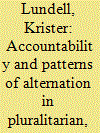

|
|
|
|
|
| Publication |
2011.
|
| Summary/Abstract |
One of the core values in a democracy is the possibility for citizens to bring about alternation in power if they disapprove of the governmental policy. This article examines patterns of alternation and the degree of accountability in three different democratic systems: pluralitarian (characterized by a two-party system), majoritarian (moderately fragmented party system) and consensus (very fragmented party system) democracies. The extent of non-alternation as well as wholesale alternation decreases as we move from pluralitarian to majoritarian and further on to consensus democracy. When alternation is related to election results, majoritarian systems are the most responsive ones, whereas consensus systems generate the lowest degree of accountability.
|
|
|
|
|
|
|
|
|
|
|
|
|
|
|
|
| 2 |
ID:
087046
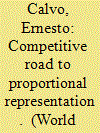

|
|
|
|
|
| Publication |
2009.
|
| Summary/Abstract |
One of the most noteworthy political regularities in the early twentieth century was the shift away from majoritarian electoral rules in Western Europe. The conventional wisdom suggests that proportional representation (pr) was introduced by elites who believed that under the existing majoritarian rules (simple plurality, block-vote, two-ballot rules) they would soon lose power to rapidly growing socialist parties. But this does not explain why many electoral reforms were carried out in countries with weak or nonexistent socialist parties. The author shows that increasing the number of parties distorts the seat-vote properties of electoral rules to a larger degree than previously anticipated. Under increasing party competition, electoral regimes display larger partisan biases than those observed in two-party races and crowd out minority parties that have territorially dispersed constituencies in favor of minority parties that have territorially concentrated constituencies. Using a dynamic Bayesian model for seats and votes, the author measures the partisan biases brought about by the expansion of voting rights in the late nineteenth century to explain the drive to reform majoritarian electoral systems.
|
|
|
|
|
|
|
|
|
|
|
|
|
|
|
|
| 3 |
ID:
100267


|
|
|
|
|
| Publication |
2010.
|
| Summary/Abstract |
We explore in this article an institutional foundation of agricultural protectionism in Japan, a country long recognized as resisting international pressures to open up its rice market. Using our qualitative analysis of postwar politics of agricultural protectionism and a simple formal model, we argue that farmers in Japan have stronger incentives to mobilize electoral support for the governing party in multimember district systems than in single-member district systems, because the marginal effects of mobilization on policy benefits are different under these electoral systems. Our empirical findings corroborate this claim and provide implications for the gradual changes in Japan's farm policies occurring after the electoral reform in 1994.
|
|
|
|
|
|
|
|
|
|
|
|
|
|
|
|
| 4 |
ID:
143693
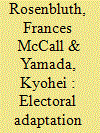

|
|
|
|
|
| Summary/Abstract |
Japan’s conservative Liberal Democratic Party swept both houses of parliament in December 2012 and July 2013 on a platform of Keynesian spending. Better known for fiscal stringency, the LDP “changed its spots” in part because 1994 electoral reforms force parties to compete on party platforms in place of clientelism.
|
|
|
|
|
|
|
|
|
|
|
|
|
|
|
|
| 5 |
ID:
105707
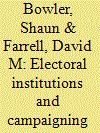

|
|
|
|
|
| Publication |
2011.
|
| Summary/Abstract |
This article develops and tests a number of competing expectations (institutional, party and individual) about what influenced the campaign activity of individual parliamentary candidates for the 2004 European Parliament elections. The principal interest is in the effects of variations in the design of electoral institutions across the Member States of the European Union. Based on the analysis, it is argued that an important distinction needs to be made between campaign effort and campaign goals, with electoral institutional factors having a more significant role over the latter.
|
|
|
|
|
|
|
|
|
|
|
|
|
|
|
|
| 6 |
ID:
121836
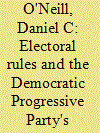

|
|
|
|
|
| Publication |
2013.
|
| Summary/Abstract |
The Democratic Progressive Party (DPP) in Taiwan increased its vote share in each legislative election from 2001 to 2008. Nevertheless, the 2004 and 2008 elections were widely viewed as major defeats for the party. Through an analysis of the DPP's performance in these elections, this article considers the effects of electoral rules on election outcomes and the perception of those outcomes. In Taiwan, under both the previous single non-transferable vote (SNTV) and the current mixed member majoritarian (MMM) systems, the mechanical effect of how electoral rules translate votes into seats and the psychological impact this has on voter and party behavior have influenced party electoral performance, and the perception of it, by causing vote and seat shares to diverge. In addition, this article analyzes whether recent redistricting in Taiwan structurally disadvantages the DPP.
|
|
|
|
|
|
|
|
|
|
|
|
|
|
|
|
| 7 |
ID:
117075
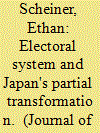

|
|
|
|
|
| Publication |
2012.
|
| Summary/Abstract |
Japan's electoral system, which emphasizes first-past-the-post, single-member district rules, has led the country's party system to become consolidated around the Liberal Democratic Party (LDP) and Democratic Party of Japan (DPJ). At the same time, Japan's electoral rules also made it likely that the two parties would not differ markedly in their policy positions, as well as hinder the emergence of new partisan alignments that could offer more clearly distinct policy options. Put differently, Japan's electoral rules have encouraged the development of what is essentially a two-party system, but one in which party alternation in power need not produce sharp policy change.
|
|
|
|
|
|
|
|
|
|
|
|
|
|
|
|
| 8 |
ID:
193654


|
|
|
|
|
| Summary/Abstract |
Research continues to find gender inequality in politics and political communication, but our understanding of the variation in the degree of bias across systems is limited. A recent meta-analysis reveals how, in countries with proportional representation (PR), the media pay considerably more attention to men politicians. In plurality systems, this bias is absent. The present study proposes a new explanation for this finding, emphasizing how the size of electoral districts moderates both the demand for and supply of women politicians in news reporting. Analyzing more than 600,000 news appearances made by Norwegian and British MPs from 2000 to 2016, we produce a detailed picture of gender biases in news visibility that speaks in favor of single-member districts in plurality systems. Although PR is generally recognized as advantageous for the political representation of women, our findings call for a more nuanced understanding of the link between electoral systems and gender equality.
|
|
|
|
|
|
|
|
|
|
|
|
|
|
|
|
| 9 |
ID:
078403
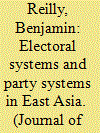

|
|
|
|
|
| Publication |
2007.
|
| Summary/Abstract |
Over the past two decades, numerous East Asian states have undergone transitions to democracy. One of the most distinctive aspects of democratization has been the way East Asian democracies have sought to manage political change by institutional innovations that aim to influence the development of the region's party systems. These reforms have typically tried to promote more centrist and stable politics by encouraging fewer, and hence larger, political parties. The result is an increasing evolution of the region's electoral and party system constellations toward more majoritarian elections and, in some cases, nascent two-party systems
|
|
|
|
|
|
|
|
|
|
|
|
|
|
|
|
| 10 |
ID:
181198


|
|
|
|
|
| Summary/Abstract |
Can governments elected under mixed-member majoritarian (MMM) electoral systems use geographically targeted spending to increase their chances of staying in office, and if so, how? Although twenty-eight countries use MMM electoral systems, scant research has addressed this question. The authors explain how MMM’s combination of electoral systems in two unlinked tiers creates a distinct strategic environment in which a large party and a small party can trade votes in one tier for votes in the other tier in a way that increases the number of seats won by both. They then explain how governing parties dependent on vote trading can use geographically targeted spending to cement it. These propositions are tested using original data from Japan (2003–2013) and Mexico (2012–2016). In both cases, municipalities in which the supporters of governing parties split their ballots as instructed were found to have received more money after elections. The findings have broad implications for research on MMM electoral systems, distributive politics, and the politics of Japan and Mexico.
|
|
|
|
|
|
|
|
|
|
|
|
|
|
|
|
| 11 |
ID:
105873
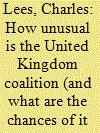

|
|
|
|
|
| Publication |
2011.
|
| Summary/Abstract |
This article draws upon insights from theoretical and empirical studies of coalition behaviour in multiparty politics to examine the formation of the United Kingdom coalition following the general election of 6 May 2010. It argues that the formation of the Conservative-Liberal Democrat coalition is not unusual in historical terms or in the context of contemporary European politics; and that although it is a break from the more recent pattern of postwar British politics it nevertheless does conform to expectations in the light of the coalition literature. The article also provides a comparative analysis of the impact of Britain's 'First-Past-The-Post' (FPTP) electoral system on party competition and an examination of the performance of the Alternative Vote (AV) system and argues that if the United Kingdom retains FPTP then a return to single-party government in 2015 is highly likely; and it is not inevitable that the introduction of AV would significantly advantage the Liberal Democrats.
|
|
|
|
|
|
|
|
|
|
|
|
|
|
|
|
| 12 |
ID:
117939


|
|
|
|
|
| Publication |
2013.
|
| Summary/Abstract |
IN DIVIDED SOCIETIES, CHARACTERIZED BY AN ANTAGONISTIC SEGMENTATION
among identity groups, formal state institutions are of paramount importance in regulating intergroup conflict. Institutional reform is thus an
appealing option to shape such state institutions-the system of government, electoral systems and party regulations, territorial state structure, the
judiciary, and the security sector-in order to promote sustainable peace
and prevent the occurrence or recurrence of violent conflict. However,
research is far from having arrived at a consensus about what institutions
work where and how. Is the choice of institutional design in a postwar situation determined at all by expected political utility? What distinguishable
effects can different designs have under what conditions? How do institutions interact-what role does the "concert of institutions" play in the
impact on sustainable peace?
|
|
|
|
|
|
|
|
|
|
|
|
|
|
|
|
| 13 |
ID:
117073
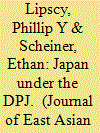

|
|
|
|
|
| Publication |
2012.
|
| Summary/Abstract |
In 2009, the Democratic Party of Japan (DPJ) brought an end to the long reign of the Liberal Democratic Party (LDP). However, despite high expectations, this politically transformative event has not unleashed significant policy change in Japan. We highlight five electoral factors that have acted as important constraints on policy change under DPJ rule. First, majoritarian electoral rules have led to a convergence in the policy positions of the two major political parties. Second, as the parties' policy positions have become more similar, voters have increasingly cast ballots based on "valence" (i.e., nonpolicy) evaluations. Third, large national vote swings have limited the tenure of young, inexperienced candidates who might otherwise serve as the instigators of reform. Fourth, Japan's electoral rules permit inconsistency across policy positions within parties and discourage greater policy coherence. Fifth, the continuing influence of rural regions has limited the scope of policy reform under the DPJ.
|
|
|
|
|
|
|
|
|
|
|
|
|
|
|
|
| 14 |
ID:
113557
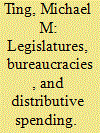

|
|
|
|
|
| Publication |
2012.
|
| Summary/Abstract |
This article develops a theory of bureaucratic influence on distributive politics. Although there exists a rich literature on the effects of institutions such as presidents, electoral systems, and bicameralism on government spending, the role of professional bureaucrats has yet to receive formal scrutiny. In the model, legislators bargain over the allocation of distributive benefits across districts. The legislature may either "politicize" a program by bargaining directly over pork and bypassing bureaucratic scrutiny, or "professionalize" it by letting a bureaucrat approve or reject project funding in each district according to an underlying quality standard. The model predicts that the legislature will professionalize when the expected program quality is high. However, politicization becomes more likely as the number of high-quality projects increases and under divided government. Further, more competent bureaucrats can encourage politicization if the expected program quality is low. Finally, politicized programs are larger than professionalized programs.
|
|
|
|
|
|
|
|
|
|
|
|
|
|
|
|
| 15 |
ID:
143280


|
|
|
|
|
| Summary/Abstract |
The implications for funding a military, though important, are still not fully understood. Existing work often surmises that military spending is higher in majoritarian electoral systems that are predicated on personalistic ties. However, further examination casts doubt upon these findings. Accordingly, we present a pooled time-series cross-sectional analysis of military spending and electoral institutions and we find that party-based electoral systems, rather than majoritarian ones, foment higher military spending levels—which we attribute to these systems’ predilection for public goods spending. These results are robust even when a host of control measures and four different military spending metrics are employed.
|
|
|
|
|
|
|
|
|
|
|
|
|
|
|
|
| 16 |
ID:
103541


|
|
|
|
|
| Publication |
2011.
|
| Summary/Abstract |
The 2010 general election threw traditional arguments about electoral reform into chaos: defenders of the status quo suddenly found themselves defending outcomes the existing system is supposed to prevent, while advocates of reform were obliged to praise outcomes arising from current arrangements. This article examines the strengths and weaknesses of first-past-the-post in the light of the 2010 result and asserts that-contrary to many claims-FPTP remains a defensible electoral system. In doing so, the article highlights the peculiar political circumstances attending the last general election, while reminding readers that other recent UK elections, conducted under other electoral systems, have not been free of serious anomalies.
|
|
|
|
|
|
|
|
|
|
|
|
|
|
|
|
| 17 |
ID:
120356
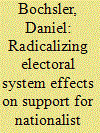

|
|
|
|
|
| Publication |
2013.
|
| Summary/Abstract |
This paper investigates electoral outcomes produced by the two-round majority system in ethnically divided societies. Earlier studies, focused mainly on the Southern American states, have revealed that in ethnically mixed environments, competitors with radical positions on ethnic issues perform particularly well. This paper extends this idea to municipal elections in Serbia, showing how radical majority nationalist parties exhibit particularly strong performances in ethnically mixed municipalities. While this effect is also apparent under proportional representation, we argue that it is much stronger when a two-round majority vote system is employed.
|
|
|
|
|
|
|
|
|
|
|
|
|
|
|
|
| 18 |
ID:
192550
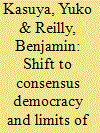

|
|
|
|
|
| Summary/Abstract |
A ‘majoritarian turn’ identified by scholars of Asian democracy in the 1990s saw the rise of mixed-member majoritarian electoral systems and more centripetal party competition across both Northeast and Southeast Asia. In this paper, we argue that since the 2000s, the institutional pendulum has shifted, with more consensual approaches to democracy appearing to better represent key identity cleavages of gender, ethnicity, and territory—a trend evident not just in East Asia but South Asia as well. This new ‘Asian model’ typically involves increasing the proportional components of existing electoral formulas and grafting gender quotas, multiethnic party lists, and quasi-federal elements onto ostensibly majoritarian state structures. We show that these reforms have, as intended, mostly increased female and ethnic minority representation and decentralized governance structures. At the same time, however, these de jure changes are not associated with de facto political development in terms of greater democratic quality, counter to theoretical expectations. Indeed, democracy has declined across most of Asia at the same time as its democratic institutions have become more consensual.
|
|
|
|
|
|
|
|
|
|
|
|
|
|
|
|
| 19 |
ID:
074777
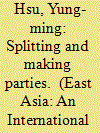

|
|
|
|
|
| Publication |
2006.
|
| Summary/Abstract |
The development of Taiwanese party politics reached a milestone in the 2000 presidential and 2001 legislative elections. The island's pre-existing three-party system underwent a marked reconfiguration. With the split of the Kuomintang (KMT), two new parties emerged but one existing party nearly collapsed. Party politics in Taiwan have shown a continuous process of proliferation of new parties. This paper analyzes the underlying logic that drives the reconfiguration of the Taiwanese party system. A political-institution perspective is employed to show how social cleavages, mixed electoral incentives, and government formation work in dictating the transformation of the party system.
|
|
|
|
|
|
|
|
|
|
|
|
|
|
|
|
| 20 |
ID:
095099
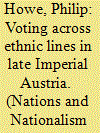

|
|
|
|
|
| Publication |
2010.
|
| Summary/Abstract |
The Austrian party system, following the introduction of universal manhood suffrage in 1907, has conventionally been characterised as being divided along ethno-national lines, reinforcing perceptions that politics within the Habsburg Empire was overwhelmingly driven by nationalism. However, the electoral results in a number of districts only make sense if one assumes that voters cast ballots for their alleged ethnic opponents. A systematic analysis of election results, utilising a simple process of elimination and drawing on the highly detailed statistical records available, strongly suggests that such voting was commonplace. Furthermore, alternative explanations based on differential voting qualification rates, errors in the census, and electoral fraud do not withstand close scrutiny. One must therefore conclude that although ethnic conflict did occur, it was paralleled by inter-ethnic bargaining and compromise, thereby supporting more positive appraisals of Austrian electoral and parliamentary politics and of representative political institutions in ethnically divided societies.
|
|
|
|
|
|
|
|
|
|
|
|
|
|
|
|
|
|
|
|
|